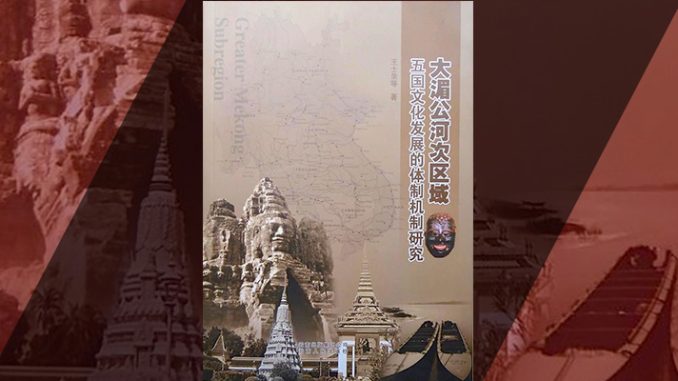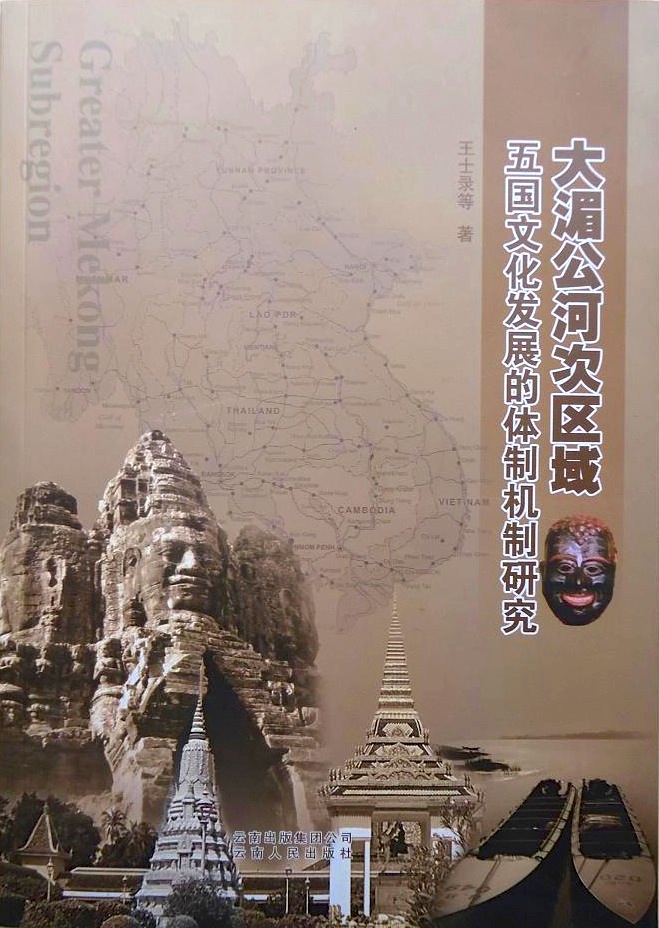
从文化视角看大湄公河次区域合作《评大湄公河次区域五国文化发展的体制机制研究》
(Viewing GMS Economic Cooperation from Cultural Horizon: Review on Study on Mechanism of Cultural Development of 5 Countries in the Greater Mekong Sub-region)
王士录 (Shilu Wang)
Publisher: Yunnan Publishing Group and Yunnan People’s Publishing House, 2011
As there has been an increase of published books on the Greater Mekong Sub-region (GMS) recently, it is the original intention of the editor of this book to look for another way to promote the economic cooperation level of GMS. Since its inception in 1992, the GMS economic cooperation has already more than twenty years of history, and advancing cooperation among its members has been its main goal. All member countries (Thailand, Vietnam, Laos, Cambodia, and Myanmar) are sharing borders to one another, and located in the central and southern peninsula. Their shared history as being deeply influenced by China and India and later interaction with the West as colonization started (except for Siam) has shaped some shared cultural traits in the celebration of diversity yet unique national identities. The editor of the book highlights this unity and diversity of cultural differences and identities among GMS member countries as their shared culture and values to look into the basic of GMS’ economic cooperation.
Under the editorship of Shilu Wang, the book consists of seven chapters written by 7 authors: Yun Fang (方芸), Zhuning Lei(雷著宁), Jin’an Ma(马金案), Qiongyao Hu(扈琼瑶), Haiqiu Yu(余海秋), Ran Yang(杨然) and Zhixu You(由志旭). All authors are members of the research team on GMS’ economic cooperation based in Yunnan Academic Social Science and Guangxi Academic Social Science.
As an anthology, the book gives readers a compact structure. The themes it highlights are important due to its composition and writing style, although it is quite thick (482 pages). In each chapter, author writes his/her article according to the relatively uniform style, with his/her individual style. Although the book is written by a number of scholars (with diverse academic backgrounds), it can be read easily.
The main thrust of the book is to bring an understanding on the GMS’ economic cooperation and the possible roles China can contribute in it. Reading through the book, readers are guided to have a fair idea on the cultural development and cultural mechanism in GMS member countries and so to understand the difference among them, and their involvement in the development of GMS economic cooperation. In that sense, the book is important for Chinese readers in mainland China (especially, in Yunnan province due to its proximity) to know about the GMS’ cultural development as accurately as possible and understand the mechanism and policies of culture and GMS’ cultural cooperation.
In this regard, the book brings a better understanding for China on the nature of GMS’ economic cooperation. Due to the fact that there is an absence of cultural elements in the economic cooperation between China (Yunnan province) and GMS member countries, there seems to be a superficial understanding on the GMS’ cultural identities. Lacking an accurate understanding of the basic national culture of GMS member countries has made China unable to finding specific ways (and avoid unnecessary conflict and disadvantages) when carrying out exchanges and cooperation in the region. Professor Wang rightly points out that it is highly important that the cultural cooperation is introduced into the GMS economic cooperation in this context. He notes that “If economic cooperation is the first stage of GMS cooperation, cultural exchanges and cooperation should be the advanced stage of GMS cooperation; It should become the stage of spiritual communication among the peoples of GMS’ countries.” (p. 1).
Although the definition of “culture” is debatable and can include a lot of things (see Chapter One, p. 1), the book does not shy away from this controversial topic. It includes discussions on the theoretical perspective of culture and international cultural exchanges and cooperation, the diversity and identity of the GMS’ culture (especially on ethic minorities), the cultural development system and policy comparison of the GMS member countries, the promotion of GMS cultural cooperation and the roles China can contribute. In that sense, the book offers important proposals for China to engage in a field that has been neglected in her economic cooperation with GMS member countries. It is undoubtedly necessary for China and five GMS countries to carry out cultural exchanges and cooperation, promote mutual understanding and further development of economic partnership and friendly relations.
This book is the first baby-step towards cultural cooperation in the economic cooperation between China and GMS member countries. It is a vast field to explore and fruitful for our better understanding and living together in the region. We do hope there will be more books by younger scholars to promote this cultural turn.
Reviewed by 赵姝岚 (Shulan Zhao)
Associate Professor, Yunnan Academy of Social Sciences
Visiting research fellow, CSEAS, Kyoto

